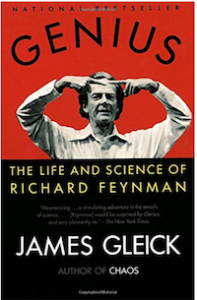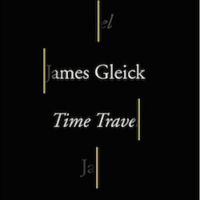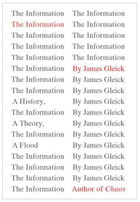This interview was recorded in 2014 and runs one hour and twenty minutes. If you are not a fan of Gibson’s novels you can skip this. If you are a fan but haven’t read The Peripheral, you should not watch this interview. The interview is notable in that Mr. Gleick doesn’t interrupt Mr. Gibson once. He lets him fully answer each question before asking the next one.
Tag Archives: James Gleick
Everything is exactly the same
“Everything is made of some other thing. And those things in turn are made of other things. Over the next hundred years, scientists will uncover layer after layer of building blocks, each smaller than the last. At each layer the differences between types of matter will be fewer. At the lowest layer everything is exactly the same. Matter is uniform. Those are the bits of God.”
— God’s Debris by Scott Adams
“Matter is incredibly, mind-bogglingly empty. An atom is like a miniature Solar System, with a tight nucleus playing the role of a Sun orbited by electrons like planets. But the nucleus is incredibly tiny compared with the orbits of the electrons. Tom Stoppard, the playwright, had the best image. He said, if the nucleus is like the altar of St Paul’s cathedral, an electron is like a moth in the cathedral, one moment by the altar, the next by the dome. Imagine squeezing all the space out of an atom. Well, if you did that to all the atoms in all the people in the world, you could indeed fit the entire human race in the volume of a sugar cube.” — Physics.org
A few months ago I read James Gleick’s biography of Richard Feynman (Genius: The Life and Science of Richard Feynman). Lots of math and physics (all way over my head, but fascinating nonetheless) and a deep-dive into particle physics, at least for me. My simplistic take-away: 1) Matter and energy are the same thing. Sometimes. 2) Everything is made of this energy/matter. Everything. My hat. My body. Donald Trump. All made of the same stuff.
It would be difficult to get through the day if we experienced reality at this sub-atomic level so our brains (consciousness?) process it in a way that won’t make our heads explode. Nevertheless, I find it comforting to think of it in this way. Little bits of god or the Universe or whatever… winking in and out of existence.
Genius: The Life and Science of Richard Feynman
 “You see, one thing is, I can live with doubt and uncertainty and not knowing. I think it’s much more interesting to live not knowing than to have answers which might be wrong. I have approximate answers and possible beliefs and different degrees of certainty about different things, but I’m not absolutely sure of anything and there are many things I don’t know anything about, such as whether it means anything to ask why we’re here. . . I don’t have to know an answer. I don’t feel frightened by not knowing things, by being lost in a mysterious universe without any purpose, which is the way it really is as far as I can tell. It doesn’t frighten me.”
“You see, one thing is, I can live with doubt and uncertainty and not knowing. I think it’s much more interesting to live not knowing than to have answers which might be wrong. I have approximate answers and possible beliefs and different degrees of certainty about different things, but I’m not absolutely sure of anything and there are many things I don’t know anything about, such as whether it means anything to ask why we’re here. . . I don’t have to know an answer. I don’t feel frightened by not knowing things, by being lost in a mysterious universe without any purpose, which is the way it really is as far as I can tell. It doesn’t frighten me.”
— Richard Feynman
Does William Gibson know what’s ahead?
“It’s the music of a disenfranchised, mostly white proletariat, barely hanging on in post-post-industrial America.” William Gibson’s All Tomorrow’s Parties was published in 1999 so the line above was written at least 17 years ago. More so than any other writer, I get the feeling Gibson somehow knows what’s ahead for us. Maybe he gave us a glimpse of that in The Peripheral. Perhaps that future is already here. I wish I could pick up the phone and call Mr. Gibson or Kevin Kelly or James Gleick or (insert name of really smart person here): “I’m sorry to bother you, but what do you think? Is everything going to be okay or not?”
Faster: The Acceleration of Just About Everything
Faster: The Acceleration of Just About Everything, by James Gleick (1999)
Most of us suffer some degree of “hurry sickness,” a malady that has launched us into the “epoch of the nanosecond,” a need-everything-yesterday sphere dominated by cell phones, computers, faxes, and remote controls. Yet for all the hours, minutes, and even seconds being saved, we’re still filling our days to the point that we have no time for such basic human activities as eating, sex, and relating to our families. Written with fresh insight and thorough research, Faster is a wise and witty look at a harried world not likely to slow down anytime soon. (Goodreads)
The obvious question was: how relevant is a book — written seventeen years ago — about how everything in our lives is accelerating? The author clearly understood the book would be dated before he completed it. Can only hope he write a follow-up (More Faster?). Here are a few bit that got some highlighter:
The Otis Elevator Company estimates that its cars raise and lower the equivalent of the planet’s whole population every nine days.
The fastest passenger elevators, mostly in Japan, travel at more than thirty feet per second. The record holder in the late 1990’s was a special Mitsubishi elevator in a sightseeing tower in Yokohama: more than forty feet per second, a good climb rate for an airplane.
Anger at elevators rises within seconds, experience show. A good waiting time is in the neighborhood of fifteen seconds. Sometime around forty second, people start to get visibly upset. […] Door dwell (how long we’ll wait for door to close) tends to be set at two to four seconds.
(Cigarettes and shots of whiskey) are additives for our engines. We take them to modify the working of what we now quite consciously think of as the human machine.
It was only in the machine age that people became aware of speed as a quality that could be measured, computed, and adjusted.
Reading on-line becomes another form of channel-flipping.
(In 1984) Only eighty thousand fax machines were sold nationwide. Just three years later, in 1987, virtually every American law firm had a fax machine, and within two more years, realtors and takeout restaurants and hardware stores had jumped on the train. Businesses and individual consumers bought two million fax machines in the United States in 1989.
Future anthropologists will find our pottery but not our E-mail.
Does Time Exist?
Time Travel: A History by James Gleick
 “From the acclaimed author of The Information and Chaos, here is a mind-bending exploration of time travel: its subversive origins, its evolution in literature and science, and its influence on understanding time itself.”
“From the acclaimed author of The Information and Chaos, here is a mind-bending exploration of time travel: its subversive origins, its evolution in literature and science, and its influence on understanding time itself.”
Sleeping into the future is what we do every night.
“Man can do what he will, but he cannot will what he wills.” — Arthur Schopenhauer
“People living in different countries kill each other at irregular time intervals, so that also for this reason anyone who thinks about the future must live in fear and terror. I trust that posterity will read these statements with a feeling of proud and justified superiority.” — Albert Einstein’s message in the time capsule buried at the 1939 New York World’s Fair
We know that complete certainty must always elude us. We know that for certain.
“Time and space are modes by which we think, and not conditions in which we live.” — Albert Einstein
“I have approximate answers and possible beliefs and different degrees of certainty about different things, but I am not absolutely sure of anything.” — Richard Feynman
What is time? Things change, and time is how we keep track.
Schopenhauer asserted that life and dreams are pages from the same book. To read them in their proper order is to live, but to browse among them is to dream.
No one can really explain how memories are formed and retrieved. Nor can anyone explain away Proust’s paradoxical contention: that the past cannot truly be recovered by searching our memories, by interrogating them, by rewinding the film or reaching back into the drawer; rather, that the essence of the past, when it comes to us at all,comes unbidden.
If you ever see yourself coming out of a time machine, run the other way as fast as you can. Nothing good can come from meeting yourself. — Charles Yu
We experience childhood one way when we’re living it and another way when we relive it in memory.
But if memory is the action of recollection, the act of remembrance, then it implies an ability to hold in the mind two constructs, one representing the present and another representing the past, and to compare them, one against the other. How did we learn to distinguish memory from experience?
Our conscious brains invent the concept of time over and over again, inferring it from memory and extrapolating from change. And time is indispensable to our awareness of self. […] You order the slices of your life. You edit the film even as it records.
“There were buttons and switches everywhere—buttons to call for food, for music, for clothing. There was the hot-bath button, by pressure of which a basin of (imitation) marble rose out of the floor, filled to the brim with a warm deodorized liquid. There was the cold-bath button. There was the button that produced literature, and there were of course the buttons by which she communicated with her friends. The room, though it contained nothing, was in touch with all that she cared for in the world.” — The Machine Stops by E. M. Forster
Why do we need time travel, when we already travel through space so far and fast? For history. For mystery. For nostalgia. For hope. To examine our potential and explore our memories. To counter regret for the life we lived, the only life, one dimension, beginning to end.
“We know it all now, with our thoughts travelling at the speed of tweet. We are time travelers into our own future. We are Time Lords.” — Ali Smith
If we confuse the real world with our many virtual worlds, it’s because so much of the real world is virtual.
Time’s winged chariot isn’t taking us anywhere good. […] The past, in which we did not exist, is bearable, but the future, in which we will not exist, troubles us more.
“We perceive time only because we know we have to die.” — Heidegger
Time Travel: A History (review)
Maria Popova describes James Gleick’s new book Time Travel: A History, “a dizzying tour of science, philosophy, and their interaction with literature.” A few snippets from her lengthy review:
“Why do we need time travel, when we already travel through space so far and fast? For history. For mystery. For nostalgia. For hope. To examine our potential and explore our memories. To counter regret for the life we lived, the only life, one dimension, beginning to end.”
“Things have been, says the legal mind, and so we are here. The creative mind says we are here because things have yet to be.”
“The mind is what we experience most immediately and what does the experiencing.”
“If we have only the one universe — if the universe is all there is — then time murders possibility. It erases the lives we might have had.”
One of my favorite topics by one of my favorite writers.
UPDATE: From a good piece in The Guardian: “Howard and his editors also manage a number of celebrity Beatle-fan coups, like the day when, to their astonishment, they spotted a 14-year-old Sigourney Weaver looming lankily over her fellow teenyboppers in footage of a 1964 show.”
“How Google Dominates Us”
James Gleick’s The Information was one of the more interestisng books I’ve read this year. And this piece in the New York Review of Books he talks about “How Google Dominates Us. A few of my favorites:
- “The business of finding facts has been an important gear in the workings of human knowledge, and the technology has just been upgraded from rubber band to nuclear reactor.”
- “When (we) say Google “possesses” all this information, that’s not the same as owning it. What it means to own information is very much in flux.”
- “(Google has) been relentless in driving computer science forward. Google Translate has achieved more in machine translation than the rest of the world’s artificial intelligence experts combined.”
- “The merchandise of the information economy is not information; it is attention. These commodities have an inverse relationship. When information is cheap, attention becomes expensive. Attention is what we, the users, give to Google, and our attention is what Google sells—concentrated, focused, and crystallized.”
- “Google makes more from advertising than all the nation’s newspapers combined”
- “The perfect search engine, as Sergey and Larry imagine it, reads your mind and produces the answer you want. The perfect advertising engine does the same: it shows you the ads you want. Anything else wastes your attention, the advertiser’s money, and the world’s bandwidth.”
Almost every article about Google worries about the potential danger of someone having so much information about us. And yet, few seem concerned about how much power, information and control governments have over us. I’ll trust Larry and Sergey over any politician that has come along in my lifetime.
The Information, by James Gleick
Publishers Weekly review on Amazon:
 “In 1948, Bell Laboratories announced the invention of the electronic semiconductor and its revolutionary ability to do anything a vacuum tube could do but more efficiently. While the revolution in communications was taking these steps, Bell Labs scientist Claude Shannon helped to write a monograph for them, A Mathematical Theory of Communication, in which he coined the word bit to name a fundamental unit of computer information. As bestselling author Gleick (Chaos) astutely argues, Shannon’s neologism profoundly changed our view of the world; his brilliant work introduced us to the notion that a tiny piece of hardware could transmit messages that contained meaning and that a physical unit, a bit, could measure a quality as elusive as information. Shannon’s story is only one of many in this sprawling history of information. Gleick’s exceptional history of culture concludes that information is indeed the blood, the fuel, and the vital principle on which our world runs.”
“In 1948, Bell Laboratories announced the invention of the electronic semiconductor and its revolutionary ability to do anything a vacuum tube could do but more efficiently. While the revolution in communications was taking these steps, Bell Labs scientist Claude Shannon helped to write a monograph for them, A Mathematical Theory of Communication, in which he coined the word bit to name a fundamental unit of computer information. As bestselling author Gleick (Chaos) astutely argues, Shannon’s neologism profoundly changed our view of the world; his brilliant work introduced us to the notion that a tiny piece of hardware could transmit messages that contained meaning and that a physical unit, a bit, could measure a quality as elusive as information. Shannon’s story is only one of many in this sprawling history of information. Gleick’s exceptional history of culture concludes that information is indeed the blood, the fuel, and the vital principle on which our world runs.”
The following got some highlighter during my read:
“In the long run, history is the story of information becoming aware of itself.” pg 12
“With words we begin to leave traces behind us like breadcrumbs: memories in symbols for others to follow.” pg 31
“All known alphabets, used today or found buried on tablets and stone, descend from the same original ancestor.” pg 33
“The written word was a prerequisite for conscious thought as we understand it.” pg 37

